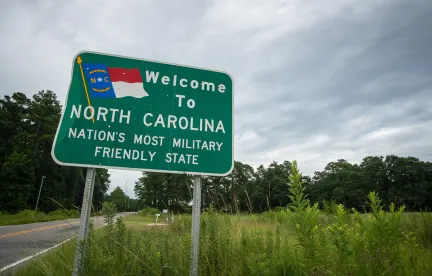LEGISLATURE RECONVENES FOR VETO OVERRIDES
North Carolina lawmakers returned to Raleigh on Wednesday for a full day of meetings and votes. Six bills previously vetoed by Governor Roy Cooper were overridden by the North Carolina House and Senate on Wednesday evening. Once the final votes were cast, they were immediately passed into law.
Cooper’s veto of a law that sets guidelines for doctors performing gender-transition surgeries or recommending puberty inhibitors or cross-sex hormones to minors was overturned. Vetoes of bills establishing a parents' bill of rights, protections against boys and men competing in women's sports, the establishment of a charter school review board, an omnibus charter school package, the reorganization of the building code council, and some statutory provisions were also overturned.
A brief summary of each bill and the override votes follows:
Gender Transition for Minors. House Bill 808 prohibits any medical professional from providing gender-affirming medical care to any transgender patient under the age of 18, including hormone treatments, puberty blockers, and surgical procedures, regardless of parental consent. On Wednesday night, the Senate voted 27 to 18 to override the governor's veto of the bill. Earlier, the House voted to override by a vote of 73–46.
Fairness in Women’s Sports Act. House Bill 574 makes clear that North Carolina athletic teams designated for females at the middle school, high school, and college levels shall not be open to students of the male sex based on the student’s reproductive biology and genetics at birth. House, 62-43 passage, 74-45 override; Senate, 31-17 passage, 27-18 override.
Code Council Reorganization and Amendments. House Bill 488 reorganizes the state's current Building Code Council into two groups, one devoted to residential construction and the other to commercial. Additionally, it forbids the council from updating the current building code for six years, adding new regulations governing energy efficiency, and allowing multifamily housing developers to use less fireproofing between residences. House, 93-26 passage, 78-40 override; Senate, 33-12 passage, 27-17 override.
Charter School Review Board. House Bill 618 establishes a new board to examine and approve charter school requests. From July 2022 forward, it would have the option to reexamine any application denials made by the State Board of Education. House, 77-42 passage, 74-45 override; Senate, 30-18 passage, 27-18 override.
Charter School Omnibus. House Bill 219 includes a number of modifications designed to make the state law governing charter schools less restrictive. As long as they are not underperforming, it permits charter schools to grow without restriction and gives some applicants preference. Additionally, it enables them to enroll and collect tuition from out-of-state and international exchange students. It also grants counties the authority to use — and even raise — property tax revenue for charters' capital requirements, which is currently unlawful. Finally, it forbids regulators from taking into account how a new charter will affect local school districts when evaluating applications. House, 61-41 passage, 7445 override; Senate, 27-12 passage, 27-18 override.
Parents Bill of Rights. Senate Bill 49 creates a Parents' Bill of Rights outlining specific parental rights concerning their children's safety, education, and health. House, 66-47 passage, 72-47 override; Senate, 26-13 passage, 27-18 override.
On Wednesday, lawmakers were 6-for-6 in rejecting Cooper’s veto stamp. All 14 of Cooper's vetoes this session have been overridden, and Cooper, whose term is limited, will leave office in December 2024. It is a 37-for-37 scorecard against Cooper when the Republicans have three-fifths majorities or better in each chamber during his tenure.
Read more by The Center Square
ELECTION REFORM BILL BACK IN PLAY
Late on Wednesday, the North Carolina legislature passed a comprehensive election reform bill that would toughen same-day registration requirements, end a grace period for counting mailed absentee ballots, and give partisan observers more power at polling locations. While removing some contentious provisions from the original, Senate Bill 747 would significantly alter requirements for absentee voting and poll observers.
The original bill contained a number of what supporters referred to as election integrity measures, including a deadline for absentee ballot delivery on Election Day, a requirement that voters who utilize same-day registration cast provisional ballots, and a ban on the use of private funds for election administration.
The new bill retains most of its essential elements but relaxes some provisions and eliminates others that critics had deemed unreasonable.
Same-Day Registration / Ballots
The House's proposal does not mandate that same-day registrants, or those who register to vote during early voting, cast provisional ballots, which are typically used for people whose eligibility as voters is questioned. They must, however, use a "retrievable ballot," which means that if the county board of elections cannot confirm their address, their vote could be invalidated.
The amended language states that if a same-day registrant's mailed voter registration card is returned to county election officials as undeliverable by the day before a county's final ballot count, their ballot will not be counted. By current law, registration can only be rejected after two failed delivery attempts.
Absentee Ballots
One previously vetoed bill contained in the measure would repeal a state law that permits traditional absentee ballots received by mail to be counted up to three days after the election if they are postmarked by the election date. Instead, these ballots must be submitted to county election offices by the close of in-person voting at 7:30 p.m. on election day in order to be counted.
A clause that would have mandated two-factor authentication for absentee ballots without specifying a specific procedure to accomplish this is eliminated in the House version.
The new version also relaxes the demand that absentee ballot signatures be verified. In the original bill, after a pilot program in the primaries, all absentee ballots would have had to go through a signature matching process before being counted in the 2024 general election. The new version only implements the pilot program, which cannot invalidate any ballots due to a mismatch of signatures but leaves open the possibility of signature matching in the general election based on the pilot's outcomes.
Board of Elections / Potential Jurors
A second clause that was vetoed prohibits county officials and election boards from accepting donations for the purpose of conducting elections. The only Democratic amendment out of 17 offered on Wednesday that was approved by the House would allow county boards to accept in-kind donations, such as use of buildings for voting purposes, as well as gifts, such as pens or food and drink for poll workers.
Additionally, the other item that had been vetoed instructs state courts to inform election officials about potential jurors who are ineligible because they are not citizens of the United States in order for those individuals to be eventually removed from voter rolls.
Poll Observers
Although less extensively than an earlier measure, the bill increases the ability of partisan poll observers to monitor election processes. With the earlier bill, House Bill 772, observers would have had full access to voting booths and even some opportunities to record video and take pictures. The new bill eliminates some of these rights, but it still makes clear that observers are allowed to move about the voting area, hear conversations between election officials and voters, and watch setup and breakdown procedures.
The majority of the suggested changes would be implemented in the early months of 2024, just before the state's closely contested primary and general elections for president, governor, Congress, the legislature, and other state and local positions.
After an extended and contentious debate, the measure was approved by the House by a vote of 69-47. The Senate swiftly approved the changes by a similar party-line vote of 27-18. It now goes to Governor Roy Cooper's desk, where he is likely to veto it.
Read more by The News & Observer
NORTH CAROLINA VETERANS’ LEGISLATION
Although the annual budget for the North Carolina General Assembly has not yet been approved, provisions in the most recent House version may have an impact on military families and veterans. In the meantime, it seems as though other bills have stalled in committee meetings.
Here is a look at what might have an impact on the military community and what might have to wait until another session.
Veterans Cemeteries
The Sandhills State Veterans Cemetery in Spring Lake could get $300,000 under the House budget, which would be used to hire companies to improve the cemetery's appearance and provide services such as grounds upkeep, equipment upkeep, and headstone marker operations. The House version, which was approved in April, is still being worked out as the Senate reconciliation process continues. (House Bill 259, page 332).
Meanwhile, House Bill 178 proposed that all four of the state's veteran cemeteries be staffed with employees to "maintain the cemeteries in a manner that honors the state's veterans and their families," and to address problems related to delays in headstone installation or damaged headstones, as well as grounds maintenance. This bill remains in the Senate Committee on Rules and Operations where it was received on May 4 after undergoing three revisions.
Veteran Homelessness
More than $13.2 million could be allocated to the North Carolina Department of Military and Veterans Affairs, and $10 million is being proposed for the department to administer a grant program to address veteran homelessness and housing instability. (House Bill 259, page 332).
Veteran Property Tax Credits
As in previous years, a number of proposed bills to give veterans property tax credits have not advanced past committees. To view the list of proposed bills regarding veteran property tax credits and other military-related legislation click this link.





 />i
/>i

